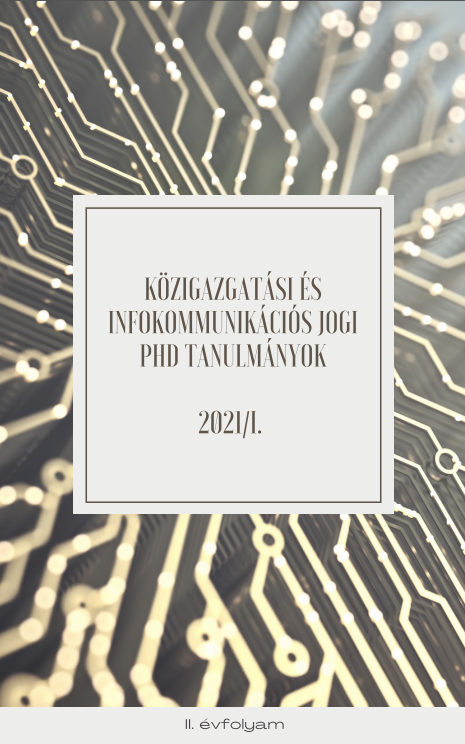Telekommunikációs eszközök használata beavatkozással nem járó kutatásokban
DOI:
https://doi.org/10.47272/KIKPhD.2021.1.1Kulcsszavak:
tudományos kutatás, adatvédelem, telekommunikációs eszközök, emberen végzett orvostudományi kutatásAbsztrakt
A COVID-19 járvány jelentős új kihívásokat jelentett szinte minden szektor, de különösen az egészségügy és az orvostudomány számára: a vírus elleni védekezés ugyanis megkövetelte az emberi érintkezések és találkozások lehető legalacsonyabb szintre történő visszaszorítását, ami leginkább az egészségügyben dolgozók tekintetében volt elvárás, hiszen az ő védelmük elengedhetetlennek bizonyult ebben a szituációban.
A kialakult körülmények nehéz helyzetbe hozták az orvostudományi kutatást végző személyeket, hiszen a kutatásokba történő bevonáshoz a kutató és a beteg személyes találkozása elengedhetetlen követelmény a tájékoztatás és betegbevonás körében érvényesülő előírások miatt. A jelenlegi helyzetben az egyén védelmét szolgáló rendelkezések inkább a tudományos kutatásokat ellehetetlenítő, és mondhatni az Alaptörvény X. cikkében deklarált tudományos kutatás szabadságát korlátozó szabályoknak bizonyultak. Jelen tanulmány a problémára lehetséges megoldást nyújtó telekommunikációs eszközök alkalmazhatóságának kérdéseit vizsgálja.
Letöltések
Hivatkozások
Balogh Zsolt György: Az emberi méltóság: jogi absztrakció vagy alanyi jog, Iustum Aequum Salutare, 35(6), 2010.
Dósa Ágnes – Hanti Péter – Kovácsy Zsombor: Kommentár az egészségügyi törvényhez. Budapest, Wolters Kluwer, 2016.
Drinóczi Tímea: Az információszabadság elhelyezkedése az alapjogi rendszerben, különös tekintettel a más alapjogokkal való kapcsolatára. Infokommunikáció és Jog, 2004/3.
Evelien De Sutter, et. al..: Implementation of Electronic Informed Consent in Biomedical Research and Stakeholders’ Perspectives: Systematic Review. Journal of Medical Internet Research, 22(10), 2020, e19129. DOI: https://doi.org/10.2196/19129
Hanti Péter: Kommentár az egészségügyi adatvédelmi törvényhez. Budapest, Wolters Kluwer, 2013.
Jóri András (Szerk.): A GDPR magyarázata. Budapest, HVG-ORAC, 2018. 22. o.
Kovács József: A modern orvosi etika alapjai: Bevezetés a bioetikába. Budapest, Medicina Könyvkiadó, 2006.
Székely Iván: Fórum. Fundamentum, 2004/4.
Szőke Gergely László: Az adatvédelem szabályozásának történeti áttekintése. Infokommunikáció és Jog, 2013/3.
Zeller Judit: A testen kívül létrejött embriók morális és jogi státusa a reprodukcióhoz való jog és a tudományos kutatás tükrében. Pécs, Pécsi Tudományegyetem Állam- és Jogtudományi Doktori Iskola, 2009.
Downloads
Megjelent
Verziók
- 2021-07-01 (2)
- 2021-07-01 (1)
Hogyan kell idézni
Folyóirat szám
Rovat
License
Copyright (c) 2021 Közigazgatási és Infokommunikációs Jogi PhD Tanulmányok

This work is licensed under a Creative Commons Attribution-NonCommercial-ShareAlike 4.0 International License.
A cikk felhasználási jogaira bármely harmadik fél számára az első közzétételt követően a Creative Commons Attribution-NonCommercial-ShareAlike 4.0 (CC-BY-NC-SA 4.0) licenc feltételek az irányadók.














